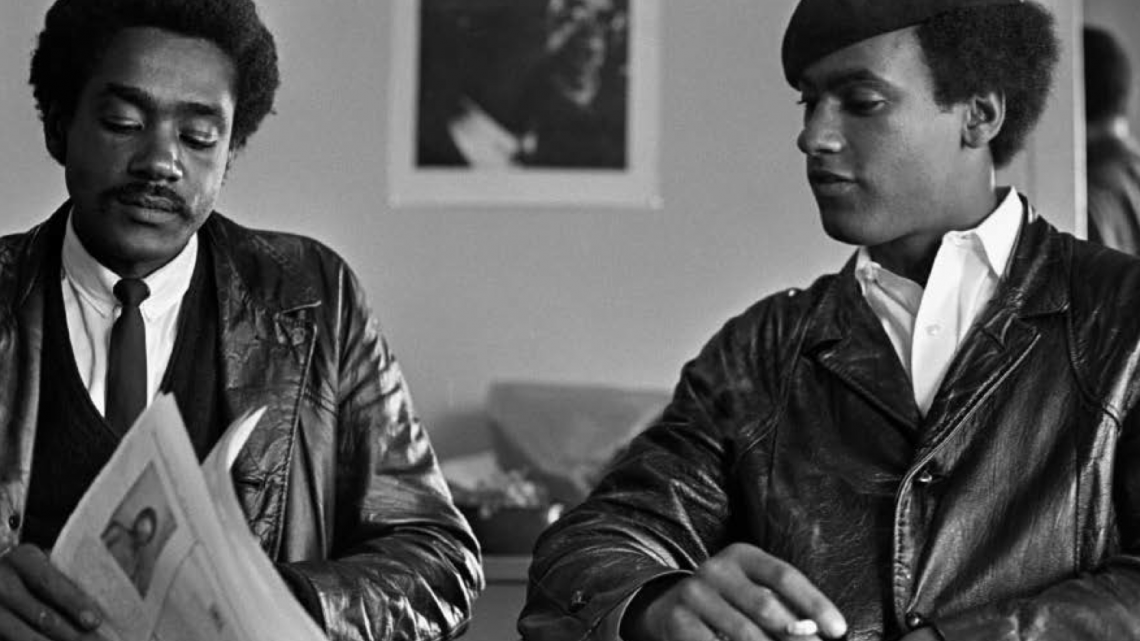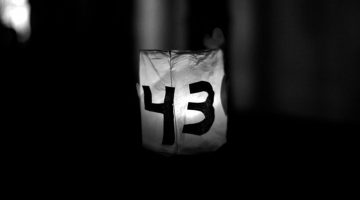Repression Breeds Resistance
January 16th, 1970
Huey Newton In Conversation With Sechaba*
Mr. Newton, welcome back from jail and thank you for granting us this interview. First we would like you to explain the relationship between the Black Panther Party and the Black Power movement.
The Black Panther Party grew out of the Black Power movement, but the Party transformed the ideology of Black Power into a socialist ideology, a Marxist-Leninist ideology. The Black Power movement has a tendency to have a capitalistic orientation along the lines of Marcus Garvey’s program and the kind of organization that Elijah Muhammed has. The Black Panther Party feels that not even the Black bourgeoisie will be able to compete with imperialism, whose central base is here in North America. The United States is the central base of the bourgeoisie, and this is because this country is really not a nation any longer, but an empire that controls the world through economics and physical force—military might. The Black Panther Party has transformed this movement into a socialist movement and we have become not nationalists, like the Black Power movement in the past, but internationalists.
The bourgeoisie that is based here in America has an international character because it exploits the world, it controls the wealth of the world; it has stolen, usurped, the wealth of the people of the world, including the people who are in the Black colony here in America and who were stolen from Africa. We feel that the only way that we can combat an international ene-my is through an international strategy of unity of all exploited people who will overthrow the international bourgeoisie and replace it with a dictatorship by the proletariat, the workers of the world. And we feel that after imperialism is destroyed, nationhood will no longer be necessary, for the state will then wither away. Then the whole world will belong to the people and the old national boundary lines will no longer exist. We think that the movement is at this stage; we think that the dialectics are now on the verge of taking socialism, social ideology, to its final goal: communism and the absence of statehood.
Do you want to say a little about the program of action in the immediate future for the Party and for yourself?
Our program is armed struggle. We have hooked up with the people who are rising up all over the world with arms because we feel that only with the power of the gun will the bourgeoisie be destroyed and the world transformed. We feel that the imperialists will not become Buddhists overnight; they will not lay down their butcher knives. Therefore, the people will have to use certain measures to restore peace to the world and to restrain the madmen who are running amuck through-out the world and oppressing people everywhere. The World-Enemy-Number-One is the ruling circle in the United States of America. We view the United States as the “city” of the world and all the other countries as a “countryside.”
As one country becomes free, it makes each country stronger because it develops a base of liberated territory so that we’ll be in a better strategic position to fight, and also it will be one step toward cutting off the raw materials that imperialism needs to feed its factories here at home. We will slowly strangle imperialism by freeing one country after another. This is why we support the brothers and sisters in Southern and Northern Africa as well as those in Asia and Latin America who are struggling against capitalism and imperialism, for socialistic goals. We support all struggles where people are struggling for freedom, and we also support our European brothers and sisters who are struggling to overthrow the bourgeoisie in their country. While we are not nationalists, we support national wars of independence because this is a step again towards cutting off the international bourgeoisie which is based in the United States. We feel that every country has a right to be nationalistic to a point, as long as they are internationalists at the same time. We feel that Black people in America have a moral right to claim nationhood because we are a colonized people. But history won’t allow us to claim nationhood. We must take socialist development to its final stage to rid the world of the imperialist threat—the threat of the capitalist and the warmonger. Once America is destroyed then there will be no need for nationhood because the nations will no longer need to defend themselves against imperialism, for this is the most powerful imperialist country in the world, and other imperialist countries depend on the backing of the U.S. At this point the imperialist is running rampant. Therefore any country has a right to claim nationhood or be nationalist as long as they are internationalists as well.
If they are only nationalist then they are chauvinist. If they are both nationalist and internationalist they realize that they need liberated territory, but they also realize that their interests are the same as every other people’s interest who are fighting against imperialism. While we respect your fight for nationhood and independence, and we struggle with you, we feel that we must destroy the very necessity for countries to be nations in the first place. And this is the whole idea of making the world a place where territorial boundaries will no longer be necessary.
The leadership of the Black Panther Party has come under very severe attack during the past year. Can you tell us what effects these attacks have had on the Party?
Repression breeds resistance. We feel that by virtue of the fact that we are being attacked, and the attacks are extremey vicious, that we must be hitting a sensitive spot. We have the fascists disturbed and they are running amuck simply because we are threatening them. We are threatening their very foundation, their very existence. Otherwise they would try to pretend to the world that this is democracy and they would support our right to freedom of speech, our right to freedom of the press, and our right to political activity. But all these so-called democratic civil rights are denied the Black Panther Party, which is the vanguard of the people. So the Party must be hitting a sensitive spot; it must be threatening the bureaucratic imperialistic capitalist. We welcome all attacks. We will overcome all obstacles and advance wave upon wave. We will rid the world of the bourgeoisie and destroy all of the monsters, and the whole world will belong to the people.
Do you believe there are revolutionary possibilities in the United States?
I would like to emphasize that without the people of the world struggling against imperialism, we would have a very weak position here in the United States, which I call the urban area of the world. But because we know we have friends, comrades-in-arms who are fighting the same enemy that we are fighting, we feel that what we have done is to open up a new front. We should say we are attempting to open up a new front because we do not claim anything that we haven’t done. But we are advancing the fight, we are strengthening our strategy of resistance and attack. We can do this because we realize the American fascist troops are being divided by the people of the world who are struggling against them. We encourage, we admire, we have great admiration for socialist or communist guerrillas all over the world. We feel we will never be free until many colonized people are free. We notice that in most revolutions where a guerrilla-type tactic was used, the urban area or city was the last area to be covered and bases opened up first in the countryside. Now we see many bases opening up in the countryside. We have advanced to the point where in many areas we have gone from a guerrilla to a kind of people’s army that can operate with a face to face, head-on collision with the imperialist. This is only because of the great perseverance and great strength that you have shown, and that the people of the world have shown. While we are being attacked from all sides, we are still trying to follow your examples. We realize that you are also being attacked from all sides by the enemy. Because you are driving on you have given us strength to drive on. So onward to victory. We will someday meet and celebrate our victory because I know we will have that. The guerrilla band is our example.
What has been the most important inspiration for the Black Panthers?
I think that not only Fidel and Che, Ho Chi Minh and Mao and Kim Il Sung, but also all the guerrilla bands that have been operating in Mozambique and Angola, and the Palestinian guerrillas who are fighting for a socialist world. I think they all have been great inspirations for the Black Panther Party. As I’ve said before, they’re examples of all these guerrilla bands. The guerrillas who are operating in South Africa and numerous other countries all have had great influence on us. We study and follow their example. We are very interested in the strategy that’s being used in Brazil, which is an urban area, and we plan to draw on that. And we have certainly been influenced by all of the people who are struggling in the world. As far as control is concerned, our Central Committee controls our Party. But I won’t deny the influence. We don’t consider that question an accusation because I think we all should learn from each other.
Last year there was a United Front, The National Conference to Combat Fascism, which included a number of groups including SDS, the Dubois Club and the Communist Party of the United States. What is the Black Panther Party pol-icy on this kind of relationship?
Our policy is that we are friends with all Marxists and want coalitions and allies within this country and all over the world. We could never have success without a popular movement, and when I speak of “popular” I mean it in the truest sense of the word, in the internationalist sense. We have to have a popular mass in order to achieve victory because victory is not for us, but the people. Therefore the people must be considered and the people must take a part in the struggle at every level.
We view part of our role as a vanguard is educating the people as we go, orientating them and providing an understanding of the social forces that are in operation and the dialectics at the time. We can only do this through involving the people in practical application, and involving them at every level of the struggle. And we do have relationships and coalitions and just comradely love and work with all these groups, and we hope to even expand this to other groups, some we haven’t even heard of yet.
Would the Black Panther Party like to set up or establish more direct contacts with the liberation struggles of Africa, Latin America, and Asia?
Yes, we think that we can learn even more from each other if we were to establish better means of communications. One of the chief difficulties is a matter of communications. It is an international struggle. The Black Panther Party even thinks in terms of a new International, an International based upon armed struggle and the socialist ideology. We feel the International that exists now is somewhat deteriorated, as far as the Third World is concerned, especially the Third World countries involved in armed combat. The International has half-stepped and criticized many of the national wars of independence and the armed struggle tactic as being too hasty and without enough orthodox political development. We see the need to overthrow the evil gentry and corrupt officials and we see only one way to do this. We do not believe we can do it through negotiation or electoral politics or any kind of non-violent means. The enemy is a violent man and we must treat him in an appropriate way.
And more specifically, would you be interested in having contact with the liberation movement of Southern Africa and, if so, in what form?
As you know, we have offered troops to the Vietnamese people to show our international solidarity. At the same time we also made it clear that we would send troops or offer troops to any of our friends who would accept them. We think the ultimate gesture of friendship that we could offer is to send our comrades to shed blood on your soil in the name of freedom, in the interest of the people, and against the imperialist enemy. If there is anything else that we can do other than to struggle to break the chains that shackle us, then let us know about that and we will be willing to consider it.
Is there mass interest in the United States about the struggle in Southern Africa? What can Sechaba do to publicize the South African revolution among the Black people in the United States?
We, the Black Panther Party, are a vanguard group, so necessarily we are more enlightened than the masses and we are very interested in the international scope of things. The people are as people all over the world, so tied up and so involved in their survival from day to day that much of the time they over-look, or they don’t understand, the international nature of the struggle. That is why it is our duty—one of our first duties—to raise the consciousness of the people through education. We would like more information about the struggle in Southern Africa. We are familiar with it right now, but we would like more information on your armed struggle and what the guerrillas are doing so that we can spread this information. We would like film footage. We have trucks that we drive around in the community and show films to people that walk in the streets.
For example, we have films of the revolution that took place in Algeria. The community is very impressed with that kind of thing because they can easily see the relationship between the way the French treated the Algerians and how we are treated in this country. There is an old saying: “A picture is worth a thousand words,” and the people perhaps don’t read as much as they should, so we found in our political education that it is very helpful to show films. If you have any pictures or film footage you can get to us I will assure you that it will be shown inside of the Black community, the Chinese community, the Indian community, the White community. There are poor White people in this country who are now becoming involved in the common struggle, and we are involved with them. We hope this national kind of involvement of many ethnic groups will aid us in relating to the people and help them make that jump to identify with people in other countries who may be from other ethnic backgrounds, other cultural backgrounds.
* Sechaba is the official organ of the African National Congress of South Africa, a liberation party which, having been banned in South Africa, operates in exile. This interview was arranged by the Africa Research Group with the assistance of Karen Wald, and took place in Berkeley within a week of Huey Newton’s release from a three-year jail term.
Reprinted with permission from To Die for the People, published by City Lights Books, 2009.



